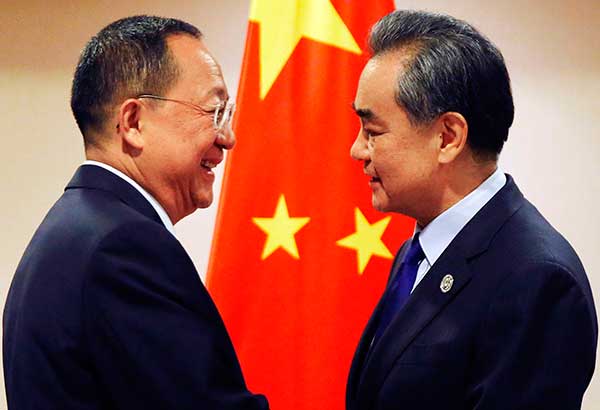Philippines backs new UN sanctions on NoKor

North Korean Foreign Minister Ri Yong Ho, left photo, is greeted by his Chinese counterpart Wang Yi prior to their bilateral meeting on the sidelines of the 50th Asean Foreign Ministers’ Meeting in Pasay City yesterday. AP
MANILA, Philippines - The Philippines yesterday supported the United Nations Security Council’s decision to impose stiffer economic sanctions on North Korea.
“The Philippines has been consistent in its support for the various UN Security Council resolutions,” Department of Foreign Affairs spokesperson Robespierre Bolivar said.
The UN Security Council on Saturday unanimously imposed new sanctions on North Korea over its two intercontinental ballistic missile tests last month.
The sanctions could slash by a third Pyongyang’s $3-billion annual exports.
On Saturday, foreign ministers from the Association of Southeast Asian Nations (ASEAN) member-states expressed grave concern about rising tensions in the Korean Peninsula stemming from long-range missile tests by North Korea that “seriously threaten” global peace and security.
The ministers urged North Korea to immediately comply fully with its obligations under all relevant UN Security Council Resolutions.
North Korea’s foreign minister Ri Yong-Ho will attend today’s ASEAN Regional Forum (ARF), which gathers 27 foreign ministers, including those of Russia, Japan, South Korea, the United States, China and North Korea, to discuss Asian security issues.
US Secretary of State Rex Tillerson will also participate in the ARF.
The UN Security Council bans North Korean exports of coal, iron, iron ore, lead, lead ore and seafood. It also prohibits countries from increasing the current numbers of North Korean laborers working abroad, bans new joint ventures with North Korea and any new investment in current joint ventures.
North Korea has been under UN sanctions since 2006 over its ballistic missile and nuclear programs.
Earlier, Foreign Affairs Secretary Alan Peter Cayetano said the ARF is the only forum where North Korea is a participant, adding it could be a venue for continuing discussions.
Pyongyang has been with the ARF since 2000.
The US had asked ARF to isolate or even exclude North Korea from taking part in the plenary session today.
In an interview last week, Cayetano said suspending North Korea from the regional security forum would be a “very hard decision.”
“The less we talk, the more grave the situation can become,” he said.
China opposes tougher sanctions
Meanwhile, China yesterday opposed tougher sanctions on North Korea.
In response to the launches of ballistic missiles of possible intercontinental range by North Korea, the United Nations Security Council moved to strengthen sanctions on the northeast Asian country’s exports.
In a resolution adopted unanimously, the 15-member body strongly condemned North Korea’s ballistic missile launches on July 3 and 28.
“We have opposed the unilateral sanctions and actions to impose sanctions on another sovereign state by citing domestic law, that has no basis in international laws,” China’s Foreign Minister Wang Yi told reporters in an interview following the ASEAN-China ministerial meeting at the Philippine International Convention Center.
He stressed that only dialogue and negotiations is the correct way out to address the Korean Peninsula issue.
On the political front, the council called for resumption of the Six-Party Talks and reiterated its support for the commitments set in the joint statement of Sept. 19, 2005 issued by China, North Korea, Japan, the Republic of Korea, the Russian Federation, and the United States.
The commitments included "that the goal of the Six-Party Talks is the verifiable denuclearization of the Korean Peninsula in a peaceful manner, and that the United States and the DPRK respect each other’s sovereignty and exist together peacefully.
“It’s not that easy, but it is a direction that we need to work together toward, only dialogue and negotiations is the correct way out to address the Korean Peninsula issue,” Wang said.
“That’s also provided for the joint just concluded UN Security Council Resolution 2371 endorsed by all the 15 members of the UN Security Council, including the United States,” he added.
The council reaffirmed its previous decisions that North Korea not conduct further launches using ballistic missile technology, nuclear tests, or any other provocation.
It moved to strengthen the sanctions on North Korea in imposing a full ban on the export of coal, iron and iron ore.
Previously these items could be exported for livelihood purposes, for a limited amount.
Most realistic, plausible
Wang was scheduled to meet separately with his North Korean counterpart Ri while South Korean Foreign Minister Kang Kyung-wha has expressed hope that she could meet Ri also.
Wang said he hoped all parties involved could seriously consider China’s dual suspension proposal, whereby North Korea halts its nuclear and missile tests and for South Korea and the US to stop joint military drills.
“This is currently the most realistic and plausible initiative and it is the most reasonable and friendly solution,” Wang said.
“This solution can alleviate the current tensions, it can resolve the most pressing security issues of all sides.” – With Pia Lee-Brago, Reuters
- Latest
- Trending


























